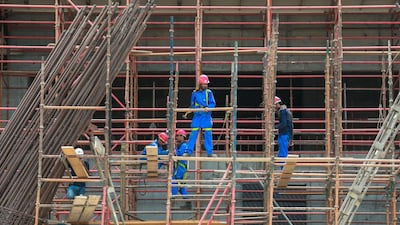New laws should be introduced offering fairer terms for contractors and a Construction Contracts Act passed to codify things such as payment times and adjudication processes, according to a new industry think tank.
A white paper published on Sunday by the newly-formed UAE Construction Think Tank makes 15 recommendations for improving the industry, which includes proposals to properly vet contractors before allowing them to bid for work and granting permanent or semi-permanent visas to engineers based on their professional experience rather than just academic qualifications. It also encourages the establishment of a Construction Industry Development Board to act as a liaising body between the industry and authorities.
“One of the biggest problems that this industry has is a one-sided contract,” said Mohammad Khader Al Shouli, managing director and head of contracting finance at Mashreq Bank, which has brought the think tank together alongside industry title MEED. “The risks are always passed on to the contractor and that executing supply chain.”
The think tank has pulled together some of the biggest names in UAE construction representing different parts of the supply chain. It includes consultants like Aecom, Atkins and KEO, contractors such as Arabtec, Alec and Arabian Construction Company, law firm Clyde & Co and technology supplier SAP.
Mr Al Shouli said current procurement laws weigh too heavily in favour of clients, especially given the use of performance bonds that contractors need to provide as open-ended guarantees.
“It doesn’t become a collaborative process. It is a master-servant or slave type of relationship. In good times, when there is an abundance of money or work, people are happy with it. But all of the problems in that type of relationship appear when there is distrust. The owners have absolute power that is unjustified sometimes,” he said.
More equitable forms of contracts would encourage contractors to invest more in innovation; the report highlights low margins as one of the main challenges to innovation in construction, with the sector only recording productivity gains of 6 per cent over the past 60 years the paper said, citing a McKinsey Global Insights report.
Current rules encourage the acceptance of lowest bids to build projects, which can often lead to disputes, Mr Al Shouli said.
“Lowest price has always been the most expensive,” he says, arguing that it often leads to contractors to submit claims for variations to improve margins, which can then lead to disputes and delays in project delivery.
Other recommendations include the establishment of a contractors’ accreditation scheme, a professional development body to improve technical skills, introducing regulations for emerging technologies such as artificial intelligence to encourage their use and coordinating the timing of project launches by government and government-related entities “to ensure countercyclical spending”.
“Continuing to do things in the same way will not deliver the transformation the construction industry needs,” the report argues.
Mr Al Shouli said the UAE could also benefit from the establishment of a professional court to handle contract disputes, citing the UK’s specialist Technology & Construction Court, which resolves most cases within 46 days.
“We have a lot of contracts we saw … it took like six-to-nine years to disentangle them. Some companies cannot last — they just disappear in the process.”
A report published in July by Netherlands building consultancy firm Arcadis found the average value and length of construction disputes in the Middle East were higher than other regions in the world. The average dispute value in the Middle East was $56.7 million (Dh208.25) in 2018, higher than the global average of $33m but a 38 per cent year-on-year decline from $91m in 2017. The average dispute length was 20 months, slightly ahead of the global average of 17 months.


